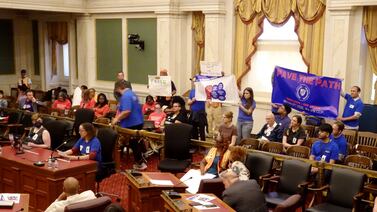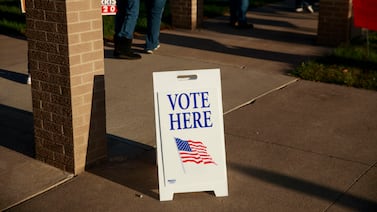Sign up for Chalkbeat New York’s free daily newsletter to keep up with NYC’s public schools.
On the heels of a sweeping mandate to overhaul elementary school reading programs, New York City officials now have their eyes on middle and high school — and they’re asking families to weigh in.
The city’s Education Department is launching focus groups for parents and students this month with the goal of “evaluating ELA curriculum for grades 6 to 12,” according to a notice sent to parent leaders.
The online focus groups, which will take place on Oct. 25 and 30, are the latest sign that city officials are interested in standardizing curriculums at the middle and high school level even though they have not announced concrete plans and appear to be keeping the public engagement process fairly quiet.
Education Department officials declined to answer questions about the sessions. After Chalkbeat inquired about the online registration form — which initially included a list of possible curriculums under consideration — those names were removed.
“We’ll delve into the ELA curriculum options under consideration,” the notice initially stated. The post indicated that families would have a chance to discuss curriculum options, review materials, and provide feedback. But that language was also removed and a department spokesperson did not explain why.
New York City principals have long had wide leeway to select their own curriculums. Schools Chancellor David Banks is pushing against that approach, concerned that it can lead to inconsistency in the quality of instructional materials educators use in their classrooms.
In Banks’ “State of Our Schools” speech last month, he said the department “will announce new approaches to instruction across all our core subject areas, in all grade levels, just as we have for early literacy” — though he indicated the process will take years.
Some high school superintendents have already begun mandating specific reading programs, though there is no centralized directive for them to do so. The city has also begun rolling out a standardized algebra curriculum at a subset of high schools.
One education department official familiar with the city’s literacy efforts said budget cuts ordered by Mayor Eric Adams could complicate the Education Department’s efforts to swiftly move forward with broader curriculum changes beyond elementary school.
“It costs a good amount of money to add curriculum to schools across the board,” said the official, who spoke on condition of anonymity because they were not authorized to speak to the press. The department “probably doesn’t want to promise that … and then not be able to do it.”
Creating focus groups for middle and high school families represents a shift from the Education Department’s strategy for choosing elementary school reading curriculums. That ambitious change, which began in about half of districts this year and will reach all districts next year, involved little input from the public. (An Education Department spokesperson did not say whether there will be similar input sessions for middle and high school educators and school leaders.)
Susan Neuman, a New York University literacy expert and former federal education official, said it’s a “promising trend” that the city is considering strengthening schools’ curriculum choices at the middle and high school level.
“We’ve ignored them completely,” she said.
But Neuman also expressed concern about whether the Education Department would take input from focus groups seriously. The city did not solicit input on the mandated elementary school curriculums from its own Literacy Advisory Council, composed of outside experts and advocates, according to multiple participants.
“There was really a good deal of frustration on that,” said Neuman, a member of the council.
Dannielle Darbee, principal of the Brooklyn Academy of Global Finance, said a more standardized curriculum could have benefits at the high school level, exposing students to rigorous texts consistently and ensuring teachers have more free time for other activities.
“Part of me welcomes the change because teachers spend a lot of time trying to build curriculum and tailor curriculum,” Darbee said.
Still, she said any curriculum mandate should include a long runway for training on the new materials. And, more importantly, she hopes high school teachers receive training to reach students who arrive significantly behind in their reading skills.
“High school teachers are not really trained at all to teach reading or assess reading levels,” Darbee said, “which brings me to the concern: What would professional development for high school teachers look like?”
Alex Zimmerman is a reporter for Chalkbeat New York, covering NYC public schools. Contact Alex at azimmerman@chalkbeat.org.








